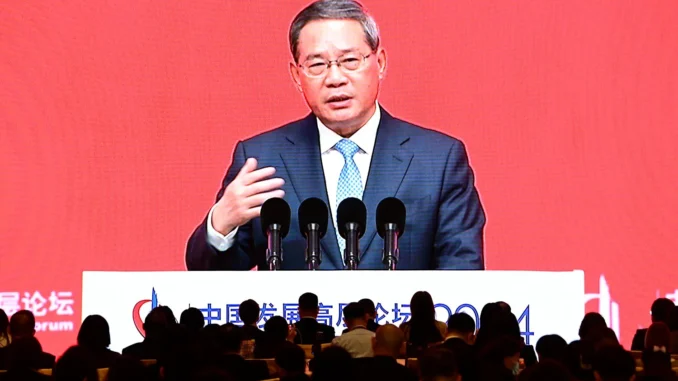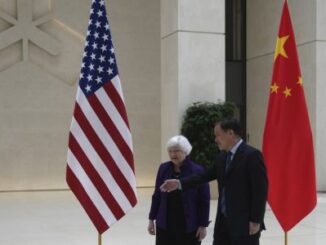
The hacking campaigns targeted hawkish lawmakers, pro-democracy activists, and Western corporations.
Welcome back to World Brief, where we’re looking at major hacking allegations against Chinese-backed actors, former Brazilian President Jair Bolsonaro’s extended Hungarian Embassy stay, and the presidential election results in Senegal.
Beijing-Supported Cyberattacks
New Zealand accused a Chinese state-sponsored actor on Tuesday of being involved in a cyber hack on Wellington’s parliament in 2021. The allegation comes just one day after the United Kingdom and the United States also accused a separate Chinese-backed group of conducting coordinated cyber campaigns to harass critics of Beijing, steal corporate trade secrets, and track high-level political figures.
“Foreign interference of this nature is unacceptable, and we have urged China to refrain from such activity in future,” said Winston Peters, New Zealand’s foreign minister.
Wellington’s intelligence services said a cyber espionage group, known as Advanced Persistent Threat 40 (APT 40), is believed to have gathered technical information on New Zealand’s parliamentary services that would have allowed for more intrusive activity in the future. Nothing of a sensitive or strategic nature was reportedly stolen. Authorities also said seven New Zealand citizens allegedly provided training to China’s military in the past 18 months, which a top intelligence official said constitutes a “major national security risk.”
In the United Kingdom, London accused Advanced Persistent Threat 31 (APT 31), another Chinese-backed hacking group, of two cyberattack campaigns. One targeted the nation’s Electoral Commission for several months beginning in August 2021. The attack compromised the voting records of 40 million people registered in Britain, Northern Ireland, and around the world between 2014 and 2022. Much of this information, however, was already in the public domain and therefore “has not had an impact on electoral processes, has not affected the rights or access to the democratic process of any individual, nor has it affected electoral registration,” according to the U.K. Foreign Office.
The second campaign unsuccessfully targeted the email accounts of several British parliamentarians who made hawkish statements on China. This reportedly included former Conservative Party leader Iain Duncan Smith, who argued that China should “immediately be labeled as a threat.” London announced sanctions on Monday against two individuals and one company linked to APT 31 for its hacking efforts.
Washington joined London on Monday in condemning APT 31, which the United States accused of targeting U.S. officials, journalists, companies, and pro-democracy activists. It said the group sent around 10,000 emails purportedly from prominent journalists containing code that, once opened, installed tracking software. This “case serves as a reminder of the ends to which the Chinese government is willing to go to target and intimidate its critics,” U.S. Attorney General Merrick Garland said. The U.S. Justice Department charged seven Chinese nationals on Monday with conspiracy to commit computer intrusions and wire fraud for APT 31.
Chinese Foreign Ministry spokesperson Lin Jian dismissed the reports on Tuesday, calling it “pure political maneuvering by the United States and the United Kingdom to once again hype up the so-called cyberattacks by China and to sanction Chinese individuals and entities.” The Chinese Embassy in New Zealand went a step further, writing in an email that “[w]e have never, nor will we in the future, interfere in the internal affairs of other countries.”
What We’re Following
Possible escape attempt. Brazil’s Supreme Federal Court on Monday gave former President Jair Bolsonaro 48 hours to explain why he stayed at the Hungarian Embassy in Brasília for two days in February. According to security footage obtained by the New York Times, Bolsonaro appeared to seek political asylum from Budapest mere days after federal authorities confiscated his passport as part of a criminal investigation into whether he tried to incite an insurrection and purposefully spread voting disinformation, among other charges.
On Monday, Brazil’s federal police launched an investigation into the far-right leader’s movements. Bolsonaro confirmed that he stayed at the embassy beginning Feb. 12 but only said, “I have a circle of friends with some world leaders. They’re worried,” when asked why. His lawyers added that Bolsonaro’s visit was to discuss political matters. The Hungarian Foreign Ministry refused to comment.
Faye declares victory. Senegalese opposition candidate Bassirou Diomaye Faye, 44, is set to become the West African nation’s youngest-ever president. Former Prime Minister Amadou Ba conceded on Monday after preliminary results showed the ruling-backed candidate with just 36.2 percent of the vote compared to Faye’s 53.7 percent. Authorities are expected to release the final results on Friday.
Faye promised to “govern with humility and transparency” in his celebratory speech on Monday, marking a peaceful transition of power in the coup-riddled region. However, the election last Sunday faced democratic hurdles. Outgoing President Macky Sall initially postponed the election until the end of 2024 in what some argued was an attempt to secure his hold on power. He later rescheduled it and freed Faye from prison just one week before the vote was to be held.
Faye had been imprisoned on defamation charges that his supporters said were politically motivated. Sall congratulated Faye on his presumptive victory and praised “the smooth running of the presidential election,” which he called “a victory for Senegalese democracy.”
Suicide attack in Pakistan. Five Chinese nationals and their Pakistani driver were killed in northern Pakistan on Tuesday after a suicide bomber collided with their van, according to Pakistan’s Interior Ministry. The laborers were working on the Dasu Dam, a hydropower project in the Khyber Pakhtunkhwa province. No group has claimed responsibility. “This isn’t an attack on the Chinese but on Pakistan’s most trusted friend,” Interior Minister Mohsin Raza Naqvi said. “We will respond in a hard manner.”
Tuesday’s assault was the third significant attack against Chinese interests in Pakistan in the past week. The first two targeted a naval base and a strategic port in Pakistan’s southwestern Balochistan province, where Beijing is investing billions of dollars in infrastructure. In total, China is currently spending more than $65 billion to help fund projects that are part of the China-Pakistan Economic Corridor.
Odds and Ends
Breakfast-lovers may find themselves in a sticky situation. Canada’s maple syrup reserve hit a 16-year low in 2023, largely due to poor harvest seasons worsened by climate change. Canada is home to the world’s only maple syrup reserve, which is located in Quebec. Just 7 percent remains of what the reserve held four years ago, though Simon Doré-Ouellet, the deputy director-general of Quebec Maple Syrup Producers, said that “we do not foresee any supply issues in the near future.” Pancakes everywhere are celebrating.



